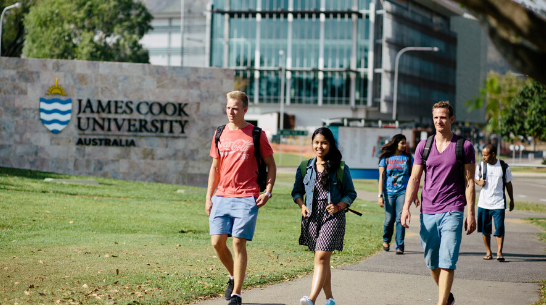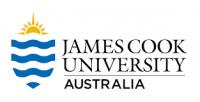Bachelor of Science
Develop your passion for innovation and make a genuine difference to your community and the environment. Undertake real-world research in unrivalled locations including the World-Heritage listed Great Barrier Reef, the Daintree Rainforest and dry savannahs.
Access state-of-the-art research and teaching facilities, like JCU’s The Science Place. Experience a leading-edge education from the world’s best institution for marine and freshwater biology studies and biodiversity conservation*.
JCU students have the opportunity to tailor their degree to suit their passion. Learn the fundamentals of science in your first year, then select one or two specialisations to continue to build knowledge and skills in your chosen discipline.
Graduate with valuable hands-on experience and distinguish yourself with your breadth of knowledge and skills.
Within this course, there are eight majors to choose from — a major is your area of expertise. You can choose to study one or two majors. Not all majors are available at all campuses.
Aquaculture Science and Technology
With lecturers who are world-leaders in tropical aquaculture research and development, discover the sustainable practices of aquaculture. Access to the JCU Marine and Aquaculture Research Facility will enhance your knowledge and provide current practical skills.
Throughout this major, you will explore the scientific and practical applications of breeding, rearing and harvesting of plants and animals in all types of water environments. You will understand the biodiversity of species and how they are farmed, the design of aquaculture systems, and the basics of nutrition.
With a focus on tropical species, our researchers’ strong links to industry will give you a sound professional network when you graduate. Career opportunities include jobs in hatcheries, stock nutrition programs and management, fresh water and marine farming, or aquaculture research.
Chemistry
Study in award-winning laboratories and gain an insight into the industry with excursions to local companies in the chemistry industry. You will benefit from small class sizes and the personalised approach of our lecturers.
Gain current skills and explore the many areas of chemistry including analytical chemistry, synthetic, organic and inorganic chemistry, and kinetics and mechanisms of chemical reactions. In your third year, you will learn a number of instrumental techniques widely used in the industry.
Accredited by the Royal Australian Chemical Institute (RACI), this chemistry major will open up career opportunities both nationally and internationally. Working across a number of industries, job prospects could include analytical chemists, research chemists, clinical diagnosticians, forensic scientists or environmental scientists.
Please note: mid-year entry is not available for the Chemistry major.
Data Science
Data and analytics capabilities have made a leap forward in recent years. The volume of available data has grown exponentially, more sophisticated algorithms have been developed, and computational power and storage have steadily improved.
Career opportunities in data science, big data and analytics are growing dramatically. Data scientists work in every industry – from defence departments to internet start-ups and financial institutions – and tackle big data projects on every level. They are among the most sought-after jobs in the tech world today.
The Data Science major packages existing data science subjects together with new subjects on Data Visualisation, Big Data and Machine Learning.
Earth Science
Offered on both the Cairns and Townsville campuses, access the biodiverse region of North Queensland. Gain relevant practical skills by studying and assessing the surrounding environments such as both the Wet and Dry Tropics, and the Great Barrier Reef Marine Park.
Experience field trips where you will collect, analyse and interpret data. You will gain a thorough understanding of the effect of humans on the natural environment and build skills to develop solutions to lessen the impact. With access to the JCU Fletcherview Research Station, you will learn about resource and environmental impact assessment, mine site rehabilitation, and soil and water science.
With an understanding of how to develop cost-effective and innovative techniques for environmental management, job opportunities exist in many sectors. You can work as a consultant, in government or industry. Potential career options could include geologist, geographer, hydrologist, soil scientist, climatologist, environmental scientist or oceanographer.
Marine Biology
Learn from lecturers who are world-leaders and be equipped to address critical challenges facing marine and coastal ecosystems. You will study in a location that gives you access to one of the most diverse and fragile marine ecosystems in the world, the Great Barrier Reef.
By studying the surrounding habitats of the Great Barrier Reef, you will discover the impact that humans have on the marine environment and how the oceans and atmosphere interact. You will gain valuable employability skills through practical experiments and opportunities to visit the JCU Orpheus Island Research Station.
Benefit from our researchers’ strong links with industry including the Great Barrier Reef Marine Park Authority (GBRMPA), TropWater and CSIRO Townsville. As a marine biologist, you could work in conservation biology and policy, environmental and resource management, fisheries biology, ecosystem restoration and marine impact assessments.
Mathematics
Develop the problem-solving, analytical and quantitative reasoning skills that are highly sought-after by employers worldwide. With small class sizes, you will get the one-on-one support required to excel as a mathematician.
Understand a number of mathematical techniques, data analysis, and multivariate statistical methods. You will learn how to formulate mathematical models to illustrate science and engineering problems, and use various techniques to help find solutions.
To enhance your employability skills, you have the flexibility to combine this major with another science major. As a mathematician, you can work in many sectors such as information technology, animated films, business and finance, astronomy and space exploration, climate study or meteorology, cryptography, and applied research.
Molecular and Cell Biology
Learn how to amplify and edit DNA sequences and conduct laboratory-based and field-based projects. Throughout your degree, you will study the basis of health and disease at a molecular level and analyse the functions of a whole cell.
Gain hands-on experience using cutting-edge equipment and techniques. Study biochemistry, microbiology, biotechnology and bioinformatics, and have an in-depth understanding of molecular genetics. These structures and processes form the basis of all living matter and provide insights into complex biological interactions.
Develop the foundations needed to work towards developments of modern medicine and biotechnology. You will have the knowledge to work across a breadth of industries — job opportunities include working in research laboratories, hospital and diagnostic departments, and biotech or pharmaceutical companies.
Physics
Explore some of the universe’s most challenging questions. Accredited by the Australian Institute of Physics, this major will give you a broad range of practical and theoretical skills across various physics disciplines.
Physicists study the laws of nature; you will learn the fundamentals of energy, quantum mechanics, relativity, antimatter, weather and climate. Develop your ability to think critically and be experimental by exploring biophysics, molecular electronics, and organic solar cells. You will study the structure of matter, atomic and nuclear physics, quantum physics, oceanography and meteorology, and thermodynamics.
As a physicist, your skills are relevant to a diverse number of careers. Job opportunities exist in industrial, scientific and educational occupations in fields such as health, meteorology, mining, environmental monitoring, energy production, telecommunications, and aerospace.
Please note: mid-year entry is not available for the Physics major.
Zoology and Ecology
Have the opportunity to learn from lecturers with global standing, study amazing rainforests and diverse species, and go on field trips to Borneo or the Galapagos Islands. Offered at both our Townsville and Cairns campuses, you will study in one of the most biodiverse regions in Australia.
Study the science of the biology of plants and animals and the natural world that they live in. Discover many of the environmental threats to the Tropics by studying the effects of deforestation, infrastructure expansion, habitat fragmentation, over-hunting, and invasive species.
You will access the various environments of the Wet Tropics and our Daintree Rainforest Observatory to learn about biosecurity, behavioural ecology, conservation biology and ecological modelling. Potential job opportunities include wildlife or environmental consultant or zoologist or ecologist for a conservation, quarantine or biosecurity organisation.
Campus Information
Cairns
JCU Cairns houses teaching and research facilities, the JCU library, cafés, bars, fitness and sporting facilities and a wealth of student clubs and societies.
Townsville
The campus is located in the Townsville Tropical Intelligence and Health Precinct (TropiQ) in the suburb of Douglas. JCU Townsville is set in a 386-hectare natural bush and parkland setting, 13 kilometres (8 miles) from the Townsville CBD.
Intakes
- Feb
- July
Application Processing Time in Days: 20
Application Process
Minimum English Language Requirements
| English Level Description | IELTS (1.0 -9.0) | TOEFL IBT (0-120) | TOEFL CBT (0-300) | PTE (10-90) | |
|---|---|---|---|---|---|
| Expert | 9 | 120 | 297-300 | 86-90 | |
| Very Good | 8.5 | 115-119 | 280-293 | 83-86 | |
| Very Good | 8 | 110-114 | 270-280 | 79-83 | |
| Good | 7.5 | 102-109 | 253-267 | 73-79 | |
| Good | 7 | 94-101 | 240-253 | 65-73 | |
| Competent | 6.5 | 79-93 | 213-233 | 58-65 | |
| Competent | 6 | 60-78 | 170-210 | 50-58 | |
| Modest | 5.5 | 46-59 | 133-210 | 43-50 | |
| Modest | 5 | 35-45 | 107-133 | 36-43 | |
| Limited | 4 | 32-34 | 97-103 | 30-36 | |
| Extremely Limited | < 4 | < 31 | < 93 | < 30 |
Job Opportunity Potential
JCU Advanced Science graduates are highly-skilled professionals who find employment in a variety of industries.
Graduates pursue careers in areas including marine biology, aquaculture, earth science, chemistry, mathematics, molecular and cell biology, physics, and zoology and ecology.
You could find employment as a research assistant, laboratory technician, scientific journalist, environmental scientist, physicist, teacher, or patent lawyer. Or you could continue onto further studies with the Bachelor of Advanced Science (Honours).
Advanced Science graduates may also choose to apply for graduate entry into science, medicine, veterinary science, physiotherapy, dentistry, or other health sciences.
Graduates who major in Chemistry may be eligible to register for non-corporate membership of the Royal Australian Chemical Institute (RACI). With an additional three years of Chemistry experience, you may be eligible to register as a Chartered Chemist with Corporate Membership of RACI.
PSW Opportunity
- 4 years
Admission Requirement / Eligibility Criteria
FOR INDIA
- All India Senior Secondary Certificate Exam (AISSCE) / Council for the Indian School Certificate Exam (CISCE) with 60 - 70%
You must have successfully completed 6 months of full-time study at a recognised higher education institution and received a minimum cumulative GPA of 4.9 out of 7.0, or minimum average results of approximately 65-70%.
You may be eligible to apply directly after high school and must provide your High School Certificate (or equivalent). These applications will be considered on a case-by-case basis.
Test
Required Score
IELTS
6.0 (no component lower than 6.0)
TOEFL (internet-based)
74 (no component less than 18)
Pearson (PTE Academic)
52 (no component less than 52)
- Course Code: 076290A
- Course Type: Full Time
- Course Level: Bachelors/UG Degree
- Duration: 03 Year
-
Total Tuition Fee:
117840 AUD
Annual Cost of Living: 24505 AUD
Application Fee: N/A
Similar Programs
- Bachelor of Psychological Science (Honours) [End-on] at James Cook University
- Bachelor of Nursing Science [Pre-Registration] at James Cook University
- Bachelor of Veterinary Science (Honours) at James Cook University
- Bachelor of Sport and Exercise Science at James Cook University
- Bachelor of Medicine, Bachelor of Surgery at James Cook University
- Bachelor of Psychological Science at James Cook University

